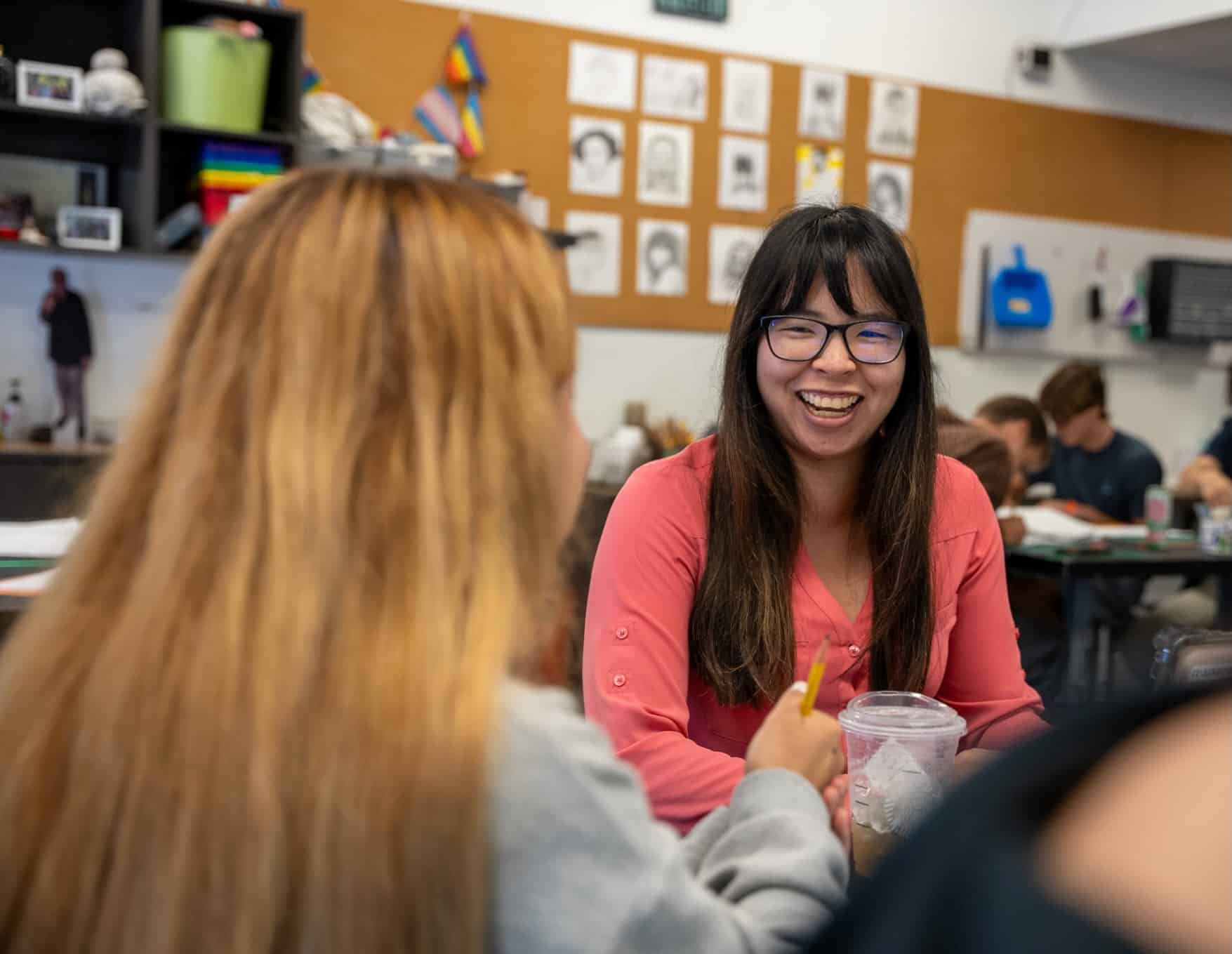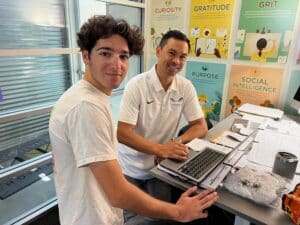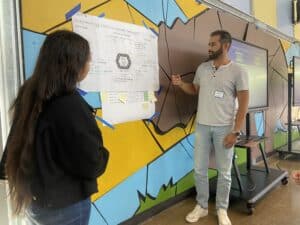
As a first-generation college student, High Tech High International alumna Alondra Rivera Vergara recalls she initially believed that higher education was out of reach. Vergara is now a sophomore at Boston University where she received an $80,000 annual scholarship for tuition and housing.
“HTHI offered resources and information on the many financial aid options, ultimately allowing me to see that college was within my grasp,” Vergara said. “They provided me with the confidence to apply through a vast range of resources, such as one-on-one counseling sessions, FAFSA (financial aid) workshops, alumni speakers, and visits from colleges both in and out of state.”
Vergara’s story reflects the success of the High Tech High college access team approach in guiding students every step of the way to attain a college education. High Tech High International is one of 16 schools in the High Tech High charter school system. Vergara received acceptance letters from 17 American universities. She credits her achievements to the support she received from her family, friends, and HTHI college counselors, who helped her see that college really could be within reach.

A college-going culture and common intellectual mission have been a part of HTH’s design since its start with a single campus in 2000. Now, rigorous, data-driven work ensures that every HTH student at its six high schools has a clear path to success in college. A San Diego Union-Tribune article spotlighted its schools as shining examples for enhancing college-going rates. The charter school network’s holistic approach to preparing students for both college and future careers is garnering attention–and for good reason.
As an equity project, HTH is particularly proud to have the highest college acceptance rates in San Diego County at 82%, said Interim CEO Dr. Kaleb Rashad. He noted this rate represents the good work of teachers, staff members and the outstanding care of college advisors–led by Mr. Chris White, the HTH network advisor.
The San Diego Union-Tribune article pointed out that, like traditional school districts, High Tech High schools hold workshops on completing financial aid and college applications. However, unlike many traditional schools, High Tech High embeds those activities into the school day and makes many of them mandatory, rather than offering them as optional events after school. “In-school support will ensure that our students are completing the applications, as opposed to after-school,” Mr. White told the newspaper.
As noted, every HTH high school has a college and career access team, a committee that helps students finish milestones for college acceptance. This has helped lead to:
The college and career access team approach was implemented across all HTH high schools starting in 2018, when each its high schools joined the CARPE College Access Network. This team is dedicated to guiding students through their college journey and plays a pivotal role in helping students define their future career aspirations and discover resources to pursue them.
Consider recent High Tech High International alumna Dayan Guerra Ramirez. She attends California Polytechnic State University, San Luis Obispo. She credits HTHI college advisor Erik Castillo and the HTHI 12th grade team for helping show her the path to college was attainable–and affordable.
“I come from a low-income family and if I had to pay out of pocket, college would not have happened,” Guerra Ramirez said, noting the availability of financial aid, scholarships, and other resources. “College was always the dream and the fact that it came true is still unbelievable. Sometimes it still feels like a dream.”
HTH and the CARPE Network
The CARPE Network, a grant-funded initiative spanning five years and led by the Center for Research on Equity & Innovation at the High Tech High Graduate School of Education (HTH GSE), concluded its impressive journey in the spring of 2023. Throughout its tenure, the network actively supported 30 schools (including HTH) across Southern California, encompassing regions from Los Angeles and San Diego to as far east as Calexico. The core mission of CARPE was to assist school teams in leveraging continuous improvement techniques to level the playing field in college access.
Fast forward to the fall of 2023, the baton has been passed to the newly minted CARPE Collaborative, and the 23 new schools across Southern California who have signed on. Its ambition remains unchanged: to bolster the numbers of students furthest from opportunity who apply to and enroll in colleges where they are most likely to graduate, says Dr. Sofia Tannenhaus, an Improvement Coach with the CARPE College Access Network at HTH GSE’s Center for Research on Equity & Innovation.
Four primary objectives drive the CARPE Collaborative’s efforts:

Improvement networks, such as the CARPE Collaborative, thrive on learning from variations within the system. One of their key strategies involves identifying and celebrating ‘bright spot schools’ that demonstrate exemplary performance and best practices. These chosen institutions then share their insights and techniques with the broader network, fostering a culture of reciprocal learning—a facet that has been consistently highlighted by network members as one of the most valued aspects of the CARPE initiative.
One such institution that repeatedly garnered attention for its outstanding contributions within and beyond the CARPE network was High Tech High International (HTHI). A recent podcast, “Optional is Not Equitable” highlighted the work of HTHI’s Castillo and the HTHI team. Recent statistics from HTHI show promising trends. Over the past two years, High Tech High International has experienced a 14% increase in students planning to attend a four-year college. Perhaps more impressive is a 24% jump in four-year college enrollment. In addition, approximately 30% of their students are stepping into college without the burden of college loans. Dr. Sofia Tannenhaus says, “Even more encouraging is that approximately half of the graduating class will face loan amounts under $5,000. These figures underscore the school’s dedication to guiding students and families through the often complex world of financial aid.”
This year, HTHI reported a record number of one-on-one sessions with students and parents, indicating a deeply personalized approach to education and future planning. Observers and educators alike are keen to monitor how these trends evolve in the coming years.
The synergies between HTHI and the CARPE Network led by the HTH GSE highlight a shared commitment to ensuring every student in Southern California has a clear and affordable pathway to college.
“I’m actively seeking opportunities to enhance my skills and knowledge required to achieve my goals,” answered Rivera Vergara when asked how her experience in college has been since graduating from HTHI. “It has been an exhilarating journey so far filled with both highs and lows but overcoming those obstacles has taught me lessons that I wouldn’t trade for anything else.”
Thanks to the financial education and academic support Alondra received at HTH through the CARPE network, her entrepreneurship goals are closer to becoming a reality.
Tags: